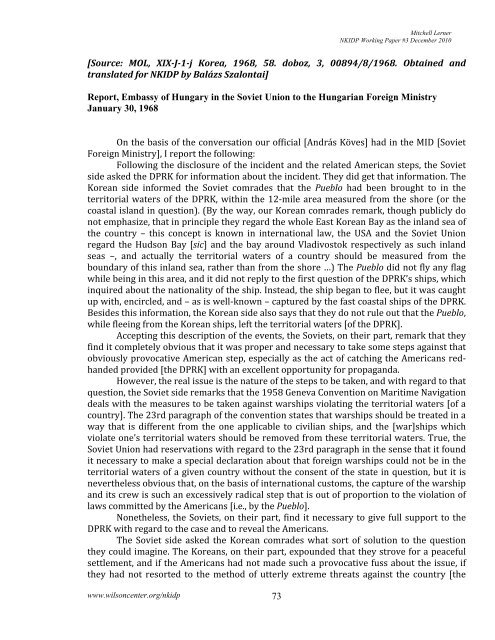"Mostly Propaganda in Nature:" Kim Il Sung, the Juche Ideology, and ...
"Mostly Propaganda in Nature:" Kim Il Sung, the Juche Ideology, and ...
"Mostly Propaganda in Nature:" Kim Il Sung, the Juche Ideology, and ...
You also want an ePaper? Increase the reach of your titles
YUMPU automatically turns print PDFs into web optimized ePapers that Google loves.
www.wilsoncenter.org/nkidp 73<br />
Mitchell Lerner<br />
NKIDP Work<strong>in</strong>g Paper #3 December 2010<br />
[Source: MOL, XIXJ1j Korea, 1968, 58. doboz, 3, 00894/8/1968. Obta<strong>in</strong>ed <strong>and</strong><br />
translated for NKIDP by Balázs Szalontai]<br />
Report,<br />
Embassy of Hungary <strong>in</strong> <strong>the</strong> Soviet Union to <strong>the</strong> Hungarian Foreign M<strong>in</strong>istry<br />
January<br />
30, 1968<br />
On <strong>the</strong> basis of <strong>the</strong> conversation our official [András Köves] had <strong>in</strong> <strong>the</strong> MID [Soviet<br />
Foreign M<strong>in</strong>istry], I report <strong>the</strong> follow<strong>in</strong>g:<br />
Follow<strong>in</strong>g <strong>the</strong> disclosure of <strong>the</strong> <strong>in</strong>cident <strong>and</strong> <strong>the</strong> related American steps, <strong>the</strong> Soviet<br />
side asked <strong>the</strong> DPRK for <strong>in</strong>formation about <strong>the</strong> <strong>in</strong>cident. They did get that <strong>in</strong>formation. The<br />
Korean side <strong>in</strong>formed <strong>the</strong> Soviet comrades that <strong>the</strong> Pueblo had been brought to <strong>in</strong> <strong>the</strong><br />
territorial waters of <strong>the</strong> DPRK, with<strong>in</strong> <strong>the</strong> 12‐mile area measured from <strong>the</strong> shore (or <strong>the</strong><br />
coastal isl<strong>and</strong> <strong>in</strong> question). (By <strong>the</strong> way, our Korean comrades remark, though publicly do<br />
not emphasize, that <strong>in</strong> pr<strong>in</strong>ciple <strong>the</strong>y regard <strong>the</strong> whole East Korean Bay as <strong>the</strong> <strong>in</strong>l<strong>and</strong> sea of<br />
<strong>the</strong> country – this concept is known <strong>in</strong> <strong>in</strong>ternational law, <strong>the</strong> USA <strong>and</strong> <strong>the</strong> Soviet Union<br />
regard <strong>the</strong> Hudson Bay [sic] <strong>and</strong> <strong>the</strong> bay around Vladivostok respectively as such <strong>in</strong>l<strong>and</strong><br />
seas –, <strong>and</strong> actually <strong>the</strong> territorial waters of a country should be measured from <strong>the</strong><br />
boundary of this <strong>in</strong>l<strong>and</strong> sea, ra<strong>the</strong>r than from <strong>the</strong> shore …) The Pueblo did not fly any flag<br />
while be<strong>in</strong>g <strong>in</strong> this area, <strong>and</strong> it did not reply to <strong>the</strong> first question of <strong>the</strong> DPRK’s ships, which<br />
<strong>in</strong>quired about <strong>the</strong> nationality of <strong>the</strong> ship. Instead, <strong>the</strong> ship began to flee, but it was caught<br />
up with, encircled, <strong>and</strong> – as is well‐known – captured by <strong>the</strong> fast coastal ships of <strong>the</strong> DPRK.<br />
Besides this <strong>in</strong>formation, <strong>the</strong> Korean side also says that <strong>the</strong>y do not rule out that <strong>the</strong> Pueblo,<br />
while flee<strong>in</strong>g from <strong>the</strong> Korean ships, left <strong>the</strong> territorial waters [of <strong>the</strong> DPRK].<br />
Accept<strong>in</strong>g this description of <strong>the</strong> events, <strong>the</strong> Soviets, on <strong>the</strong>ir part, remark that <strong>the</strong>y<br />
f<strong>in</strong>d it completely obvious that it was proper <strong>and</strong> necessary to take some steps aga<strong>in</strong>st that<br />
obviously provocative American step, especially as <strong>the</strong> act of catch<strong>in</strong>g <strong>the</strong> Americans red‐<br />
h<strong>and</strong>ed provided [<strong>the</strong> DPRK] with an excellent opportunity for propag<strong>and</strong>a.<br />
However, <strong>the</strong> real issue is <strong>the</strong> nature of <strong>the</strong> steps to be taken, <strong>and</strong> with regard to that<br />
question, <strong>the</strong> Soviet side remarks that <strong>the</strong> 1958 Geneva Convention on Maritime Navigation<br />
deals with <strong>the</strong> measures to be taken aga<strong>in</strong>st warships violat<strong>in</strong>g <strong>the</strong> territorial waters [of a<br />
country]. The 23rd paragraph of <strong>the</strong> convention states that warships should be treated <strong>in</strong> a<br />
way that is different from <strong>the</strong> one applicable to civilian ships, <strong>and</strong> <strong>the</strong> [war]ships which<br />
violate one’s territorial waters should be removed from <strong>the</strong>se territorial waters. True, <strong>the</strong><br />
Soviet Union had reservations with regard to <strong>the</strong> 23rd paragraph <strong>in</strong> <strong>the</strong> sense that it found<br />
it necessary to make a special declaration about that foreign warships could not be <strong>in</strong> <strong>the</strong><br />
territorial waters of a given country without <strong>the</strong> consent of <strong>the</strong> state <strong>in</strong> question, but it is<br />
never<strong>the</strong>less obvious that, on <strong>the</strong> basis of <strong>in</strong>ternational customs, <strong>the</strong> capture of <strong>the</strong> warship<br />
<strong>and</strong> its crew is such an excessively radical step that is out of proportion to <strong>the</strong> violation of<br />
laws committed by <strong>the</strong> Americans [i.e., by <strong>the</strong> Pueblo].<br />
None<strong>the</strong>less, <strong>the</strong> Soviets, on <strong>the</strong>ir part, f<strong>in</strong>d it necessary to give full support to <strong>the</strong><br />
DPRK with regard to <strong>the</strong> case <strong>and</strong> to reveal <strong>the</strong> Americans.<br />
The Soviet side asked <strong>the</strong> Korean comrades what sort of solution to <strong>the</strong> question<br />
<strong>the</strong>y could imag<strong>in</strong>e. The Koreans, on <strong>the</strong>ir part, expounded that <strong>the</strong>y strove for a peaceful<br />
settlement, <strong>and</strong> if <strong>the</strong> Americans had not made such a provocative fuss about <strong>the</strong> issue, if<br />
<strong>the</strong>y had not resorted to <strong>the</strong> method of utterly extreme threats aga<strong>in</strong>st <strong>the</strong> country [<strong>the</strong>

















